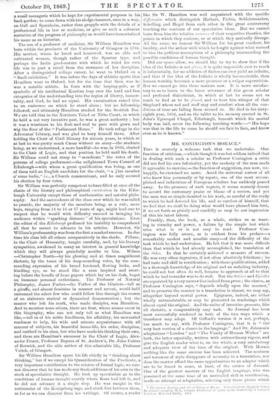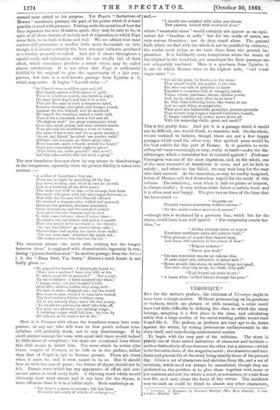MR. CONINGTON'S HORACE.* Tins is scarcely a welcome task that
we undertake. One function of criticism,—which though it was but seldom indeed that in dealing with such a scholar as Professor Coningtou a critic did not feel his own inferiority, yet the modesty of the man made it agreeable to exercise,—the function of suggestion, can now, un- happily, be exercised no more. Amid the universal sorrow of all who knew him personally or by repute, one of the most accom- plished and industrious of European scholars has suddenly passed away. In the presence of such regrets, it seems scarcely decent to accord the customary praise or blame of a review, and yet the man was so simple-hearted in his work, so careful of the study to which he had devoted his life, and so careless of himself, that we feel that we shall be doing what would have pleased him best, if we set forth as plainly and candidly as may be our impression of this his latest labour.
Frankly, then, the book, as a whole, strikes us as want- ing in vivacity and power, a failure by the simple test which tries what is or is not easy to read. Professor Con- ington was fully aware, as is evident from his preface—a remarkably modest and sensible essay—of the difficulty of the task which he had undertaken. Ile felt that it was more difficult than that which he had already accomplished, the translation of the Odes. In that he certainly achieved a measure of success. He was very often ingenious, if not often absolutely felicitous ; he had taste and skill in versification ; with these qualifications, added to a thorough knowledge of his original and an unfailing industry, he could not but often do well, because to approach at all to that which he had to render was to do well. But the Satires and Epistles are separated by avery narrow line indeed from prose ; the charm, as Professor Conington says, " depends wholly upon the manner," and to preserve the manner in a translation is almost, we may say, altogether beyond mortal power. Epigrams, indeed, are either wholly untranslatable, or may be presented in renderings which almost equal the original. And the satire of invective presents, like all rhetoric, a comparatively easy task. So Juvenal has been most successfully rendered in both of the two ways which a translator may adopt. Of Gifford's version it is not, perhaps, too much to say, with Professor Conington, that it is " the very best version of a classic in the language." Aud Dr. Johnson's adaptations "London" and "The Vanity of Human Wishes" are both, the latter especially, written with extraordinary vigour, and give the English reader what is, on the whole, a very satisfactory and adequate view of the tone of the original. With Horace nothing like the same success has been achieved. The neatness and terseness of style disappears of necessity in a translation, nor does the matter afford the same opportunities to an adapter which are to be found in some, at least, of the satires of Juvenal. One of the greatest masters of the English language, who was possessed at the same time of an unrivalled skill in versification, made an attempt at adaptation, selecting only those pieces which
• The Salim, Epistles, awl Art of aL•y ey florae?. Translated into English Verse. By John Cuniugton, M.A., Corpus Professor of Latin iu the University of Uxford. London: Bell and Daldy. 115Rt.
seemed most suited to his purpose. Yet Pope's " Imitations of Horace" constitute, perhaps, the part of his poems which it is least possible to read with pleasure. Putting aside the question of how far they represent the true Horatian spirit, they may be said to be, in spite of all those charms of melody and of expression in which Pope never fails, to be both tedious and dull. We are afraid that most readers will pronounce a verdict little more favourable on this, though it is almost certainly the best attempt hitherto produced at a version properly so called. And yet it shows throughout a careful study and elaboration which do not wholly fail of their effect, which sometimes produce a result which may be called almost satisfactory. It is not often that Pope is sufficiently faithful to his original to give the opportunity of a fair com- parison, but here is a well-known passage from Epistles ii. 2, which may serve. It begins " Luculli miles :7"
"In Cinna's wars a soldier poor and old Had dearly earned a little purse of gold ; Tired in a tedious march, one luckless night He slept (poor dog!) and lost it to a doit. This put the man in such a desperate mind, Between revenge, and grief, and hunger joined, Against the foe, himself, and all mankind, He leaped the trenches, scaled a castle wall, Tore down a standard, took a fort and all. 'Prodigious well!' his great commander cried, Gave him much praise, and some reward beside. Next pleased his excellence a town to batter, (Its name I know not, and 'tis no great matter,) 'Go on, my friend,' ho cried, 'see yonder walla! Advance and conquer, go where glory calls. More honours, more rewards, attend the brave!' Don't you remember what reply he gave ? ' D'ye think mo, noble general? such a sot ! Let him take castles who has ne'er a groat."
The new translator does not show by any means to disadvantage in the comparison, especially when his greater fidelity is taken into account :—
" A soldier of Lucullus's, they say,
Worn out at night by marching all tho day, Lay down to sloop, and, while at ease he snored, Lost to a farthing all his little hoard.
This woke the wolf in him ;—'tis strange how keen The teeth will grow with but the tongue between ;— Mad With the foe and with himself, offhand He stormed a treasure-city, walled and manned,
Destroys the garrison, becomes renowned,
Gains decorations and two hundred pound.
Soon after this the General had in view To take some fortrev, where I never knew ; Ho singles out our friend, and makes a speech That e'en might drive a coward to the breach ; Go, my fine fellow ! go where valour calls !
There's fame and money too inside those walls.'
I'm not your man,' returned the rustic wit ; 'He makes a hero who has lost his kit.'" The common phrase the teeth with nothing but the tongue between them' is employed with characteristic ingenuity in ren- dering " jejunis dentibus acer." In another passage, from the Satires i. 9, the " Ibam forte 'Via Sacra," Horace's mock heroic is not badly given :— " Ile paused for breath : I falteringly break in : 'Have you a mother ? have you kith or kin To whom your life is precious?' Not a soul: My line's extinct : I have interred the whole.' 0 happy they ! (so into thought I fell) After life's endless babble they sleep well : My turn is next ; despatch me; for the weird Has come to pass which I so long have feared, The fatal weird a Sabine beldame sung, All in my nursery days, when life was young : 'No sword nor poison e'er shall take him off, Nor gout, nor pleurisy, nor racking cough ; A babbling tongue shall kill him : let him fly All talkers, as he wishes not to die.' "
Here it is Cowper with whom the translator comes into com- parison, as any one who will turn to that poet's tedious octo- syllabics will probably think, not to any disadvantage. If he could always manage his verse with equal skill there would indeed be little cause of complaint ; but there are occasional lines where this skill seems to desert him. The verse which he writes (the heroic couplet of Cowper, as he tells us in the preface, rather than that of Pope) is apt to become prosaic. There are times when it must be, and is even meant to be so. But it should flow on with the ease of prose ; the fetters of rhyme should not be felt. Prosaic verse which has any appearance of effort and con- straint unites in itself every fault. A rhyming word which would obviously have been absent had it not been for the rhyme, is more offensive than it is in a loftier style. Such renderings as
"Yet there's a mean in morals ; life has lines, To north and south of which all virtue pines," and,— "I should rest satisfied with mine, nor choose New parents, decked with senatorial shoes,"
where "senatorial shoes" would certainly not appear as an equi- valent for " fascibus et sellis " but for the needs of metre, are very serious blemishes ; nor do they stand alone. The general fault which we find with the whole is not be justified by extracts ; the reader must judge, as we have done, from the general im- pressions. It is habitually more conspicuous where the strain of the original is the humblest, yet sometimes the finer passages are not adequately rendered. Here is a specimen from Epistles 2, one in which Horace rises to his highest note, " sed vocat usque suum "
"Yet all the plain, he fancies, to the atone That stands beside the poplar, is his own.
But who can talk of property in lands Exposed to ceaseless risk of changing hands, Whose owner, purchase, favour, lawless power, And, lastly, death may alter in an hour ?
So, with heirs following heirs, like waves at sea, And no such thing as perpetuity, What good are farmsteads, granaries, pasture-grounds That stretch long leagues beyond Calabria's bounds, If Death, unbribed by riches, mows down all
With his unsparing sickle, great and small?'' This is but poorly done. And yet it is a passage which it would not be difficult, one would think, to translate well. On the whole, we are inclined to believe, though there are not a few happy passages which tend the other way, that 'spirited prose would be the best vehicle for this part of Horace. Is it possible to write colloquial verse—seemingly so easy, really so hard—under the dis- advantages which a translator has to contend against? Professor Covington was one of the most ingenious, and, on the whole, one of the most successful of translators in verse, and yet he fails to satisfy ; and where he has failed, we may wait long for the man who shall succeed. At the same time, as may be readily imagined, lovers of Horace will find themselves repaid for the study of this volume. The rendering, even when it fails to please or interest, is always careful ; it very seldom sinks below a certain level, and it is often neat and happy. We give two or three of the lines that
we have noted :— " Aeqnum eat
Peccatis veniam poseentem reddere rursus :" "He that needs excuse must need excuse."
—though this is weakened by a previous line, which but for the rhyme could have been well spared. " For reciprocity exacts her dues,"—
" Avidos vicinnm funns ut aegros Exanimat mortisque metu sibi parcere cogit." " Sick gluttons of a next-door funeral hear, And learn self-mastery in the school of fear."
"Frigore to lariat:" "Freeze you dead."
"Cni non conveniet sus res ut calcens Si pede major erit, subvertet, si minor nret :" "Means should, like shoes, be neither large nor small, Too wide, they trip us up, too strait, they gall."
" Equi frcnati eat auris in ore:" "A horse when bridled listens through his jaws."































 Previous page
Previous page